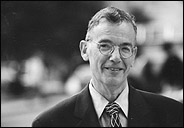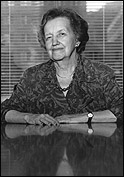The ins and outs of honorary degrees
The ins and outs of honorary degrees McGill University
User Tools (skip):
The ins and outs of honorary degrees
 Principal Bernard Shapiro and McGill neuroscientist Brenda Milner (below) have both received numerous honorary degrees
Principal Bernard Shapiro and McGill neuroscientist Brenda Milner (below) have both received numerous honorary degreesPHOTO: Owen Egan |
|
 PHOTO: Neil H&233;bert |
|
McGill neuroscientist Brenda Milner has 15. Principal Bernard Shapiro has seven. Oprah Winfrey has several, too. What do these people have in common? They're part of an elite group who've received honorary degrees from universities, a tradition that's practised the world over.
Seeing as McGill will be granting 13 such degrees this spring, to people ranging from pharmaceutical titan Jean Coutu to Concordia University rector Frederick Lowy, we thought we'd look at what it takes to get such an academic nod. And, quite frankly, we were curious to know how it feels to receive an honorary degree.
"You feel stroked," chuckles Shapiro, who was granted his seventh honorary degree from the University of Edinburgh last summer, at the same time as his twin brother, Harold, outgoing president of Princeton University.
While some people feel so stroked that they proudly display their honorific degrees on office walls, Shapiro hasn't gone that far. That's not to say he wasn't moved by his distinctions. "I now feel that I have a relationship with the institutions that have honoured me," he says, adding the kinship has prompted him "to send a cheque to their alumni associations every year."
Milner says the greatest part of getting an honorary degree is the opportunity to mix with all kinds of different people. When she received one last year from Cambridge University, for instance, other honourees included playwright Tom Stoppard. "These are people that I don't get many opportunities to meet as a neuroscientist," she says. "I was delighted."
To Lowy, a McGill graduate (BA '55, MD '59), being granted an honorary degree from his alma mater is a thrilling prospect. Perhaps more, he continues, than being named an officer of the Order of Canada in 1999 or being granted his first honorary degree from the University of Toronto in 1998. "I've always conserved very warm feeling towards McGill," Lowy says, "so receiving an honorary degree from my own university is especially gratifying."
When Lowy receives his honorary doctorate on May 23, at the health sciences convocation, he can also take pride that he'll be in particularly good company. Past recipients of honorary degrees at McGill include the aforementioned Milner and Shapiro brothers, not to mention renowned linguist and political theorist Noam Chomsky, novelist Mordecai Richler and Nobel Prize-winning scientist Rudolph Marcus.
But receiving honorary degrees isn't only about big names, pomp and circumstance. Before people even receive the academic distinction, their names must first be submitted to and approved by McGill's Honorary Degrees and Convocations Committee, composed of a dozen members including the principal, Chancellor Richard Pound, Secretary-General Victoria Lees, students and senators.
The group begins receiving honorary degree nominations in September for the spring convocation and January for fall ceremonies. Once nominations are sifted, they are approved or denied at Senate by vote.
The main criterion in receiving an honorary degree from McGill is that recipients provide inspiration and leadership to graduates. "Granting honorary degrees is our way of recognizing great achievements," says Shapiro.
The principal adds that conferring honorary degrees can be a way for a university to thank long-time supporters, too. Richard Tomlinson, who's receiving an honorary degree at McGill's science convocation on June 8, is a case in point. A McGill graduate, Tomlinson made history by giving his alma mater $64 million last spring, the largest single gift ever made by an alumnus to a Canadian university.
While Tomlinson is a respected scientist, having taught chemistry at McMaster University for four decades and having founded one of the world's largest makers of microchips, Gennum Corporation, his honorary doctorate is being conferred in gratitude of his awesome donation. "We're not going to pretend that it's for anything else," says Shapiro. "This is our way of saying 'thank you' to Richard Tomlinson, whose generosity went beyond expectation and will provide for generations of McGill students."
According to guidelines revamped in 2000 (please see www.mcgill.ca/Secretariat/degrees.html), McGill requires two-thirds of senators to approve a candidate before he or she can be granted an honorary degree. As for nominations, anyone in or out of McGill is free to make suggestions, although deans of faculties provide the bulk of proposals.
It goes without saying that all the above procedures are supposed to remain confidential. Given that honorary degree nominees can be rejected, secrecy is considered paramount, since having one's candidacy eliminated can be embarrassing.
McGill's sole and very public slip-up occurred in January 2000, when a senator breached confidentiality by leaking to the media that John Cleghorn was rejected for an honorary degree. The leak was reported from coast to coast.
It was an unfortunate situation, says Pound, since as a McGill alumnus Cleghorn was considered an ideal candidate for the distinction. Not only is he chair and CEO of the Royal Bank, he is a longstanding member of McGill's Board of Governors and headed the University's last -- and most successful -- capital campaign.
"That made John Cleghorn very deserving of the honour," says Pound. "In these cases, honorary degrees are one way, in fact the only way, that McGill can recognize outstanding contributions."
As for whom McGill chooses to distinguish with an honorary degree, the University has no politically correct agenda. That's why all spring recipients are men. "But three of the four recipients this fall are women," explains Shapiro, adding that establishing any kind of quotas on honorary degree recipients would be "inappropriate."
Yet to broaden its pool of candidates, the Honorary Degrees and Convocations Committee does encourage as many nominations as possible. Typically, its candidate pool includes 25 candidates for spring convocation, an amount that's halved when nominees are passed on to Senate.
Senators, too, would appreciate the opportunity to vote on a bigger cross-section of candidates. "I'd much prefer McGill confer more honorary degrees to people who make significant contributions to society from behind the scenes," says Robert Sim, a graduate student senator, noting most nominees are culled from the forefront of academia or corporate Canada.
Pound wishes McGill would simply be more proactive in conferring degrees, rather than following the lead of its sister institutions. "Since we like to think of ourselves as the country's foremost university," he says, "I'd like to see us granting honorary degrees first."
Pound also hopes McGill will soon target more people from the performing arts. Problem is, members of the arts community are often too busy to attend convocations and that's one of the requirements in getting the degree.
As Lees explains, "Some of these people are so busy that they're booked long before we could even schedule them for our convocations."
Indeed, scheduling conflicts are pretty much the only reason people have refused honorary degrees, since the majority of candidates gratefully accept. The only exception Lees can think of, whom she can't name, declined the honour because the person was too shy. "I find that quite lovely," Lees reflects. "It's an example of human frailty and humility that's absolutely sweet."
While Brenda Milner hasn't shied away from accepting her honorary degrees -- in fact, she was even the keynote speaker at three graduation ceremonies -- she doesn't think she'll be delivering another convocation address anytime soon. "Although you're supposed to deliver a message, I find it presumptuous to get up there and tell graduates how they should live their lives," she says. "I'm sure graduates are more eager to go out and have champagne than to have me pontificate."
How to make a proposal
|
By awarding honorary degrees, the University recognizes those individuals whose accomplishments are of such excellence that they provide inspiration and leadership to its graduates. As well, through its choice of honorary degree recipients, the University makes a public declaration of its values. In selecting candidates, the University should attempt to choose individuals of such a calibre that in honouring them, it too is honoured. The Honorary Degrees and Convocations Committee should attempt, through its recommendations of nominees, to reflect the cultural diversity of the country and the international character and diversity of the University itself. It should also attempt to honour those whose outstanding contributions to their fields or to society have not yet been widely recognized. Anyone interested in proposing an individual to receive an honorary McGill degree should send their suggestions to the Chancellor's Office: Room 536, James Administration Bldg., care of McGill's Secretariat. Nominations should include the following information: name, address of nominee, career summary, education, awards received, reasons for recommending award, evidence of suitability as a convocation speaker. Supporting documentation may be attached (e.g., curriculum vitae, news clippings). |

